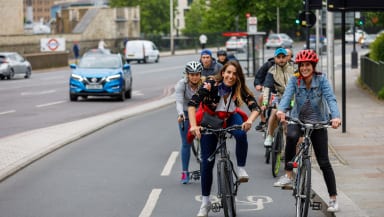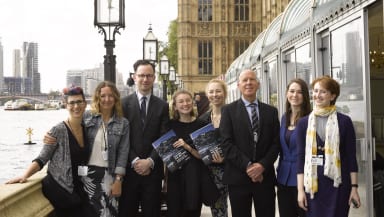There are too many cars on our roads. The latest data from the Department of Transportation shows there are 38.4 million licensed vehicles in the UK. I wanted to know what it would take for their drivers to give them up. So I asked them.
Here's a question: what would it take for you to give up your car?
— Sarah 🍓 (@SarahJ_Berry) September 16, 2020
Here’s what I learned:
“Quiet roads so I can cycle without needing to be brave”
Whilst things are improving in London and other city centres, drivers quickly made it clear that our national cycle infrastructure isn’t up to a standard where they felt like they could rely on it for all of their journeys.
The desire for protected cycle lanes came up again and again, not just within neighbourhoods but between them. And these cycle lanes need to be able to accommodate non-standard bikes, with many drivers concerned with how’d they’d manage to move kids or cargo on the current lanes they see alongside busy roads.
Cheap, reliable and connected public transportation
More than any other issue, a lack of affordable public transportation options were forcing drivers to keep a hold on their cars. These are tough times, and even though many of the drivers I spoke to would love to give up their vehicles, they couldn’t see a way that they could afford the regular train fare.
Public transport that is actually reliable, more widely available (we live in a village with 2 buses a week), and most importantly doesn't cost 3 times more than the cost of fuel for the same journey. Also more #LTNS making it safer and cleaner for us and our child to cycle.
— John Clode 🇪🇺🌍💙 (@MTBHants) September 16, 2020
Connectivity, comfort and reliability were also obstacles for some. Drivers want regular, reliable, comfortable bus and train routes that will get them from A to B without a hike at either end. Who could disagree with that?
Not enough people know about car shares
For many of the drivers I spoke to, the solution seemed obvious. They wanted to get rid of their cars. They’re sick of the financial burden they’re putting on their families. They hate the impact they’re having on the environment — but they just can’t find an alternative for the monthly journeys they need to take outside the town or city in which they reside.
In short, not enough people know about car shares. Schemes like Zipcar, HiyaCar or Enterprise Car club could be the answer these drivers are looking for, but for whatever reason, knowledge of these schemes aren’t reaching them.
Cargo bike shares
More people than I expected were aware of the benefits of cargo bikes and bike trailers and just how much you can transport with them, but they were very clear on one thing: they didn’t want to own them.
Merely the ability to easily access one when it's genuinely useful.
Most of the time, an e-cargo bike sharing scheme would be an ideal replacement.
— Rupert Wyllie (@CirclingBear) September 16, 2020
Many drivers expressed an interest in a cargo bike share scheme that would allow them to rent a cargo bike for their weekly shop or a trailer for a camping trip.
For some people, other forms of transport just aren’t an option
Many people with a disability don’t have the option to use a car. If you have a visual impairment or have epilepsy, for instance, you might not legally be able to get a drivers license.
Being able to walk more than 50-100 metres
— cheryl swanick💙 (@CherylSwanick) September 16, 2020
But for many other folk with a disability, a car is their mobility aid, and it’s a necessary tool for them to be able to thrive within their communities. We must keep their needs in mind in all our transport planning.
Once you give up your car, you never look back
For those who have found a way to ditch their cars, the joy is palpable. No one I spoke to had any regrets about getting rid of their cars. They only wished they had done it sooner.
I did move to Berlin, no need for a car. I have a bike and we have safe bike lanes. I do not miss having a car. I miss driving sometimes, but not having a car.
— Inga B (@ibvegprincess) September 16, 2020
Sold my last car in 2001. Bikes, walking, public transport, and the occasional Zipcar or hire car have transported two children from babyhood to mid-teens.
— Steve Tooze (@SteveBTooze) September 16, 2020



